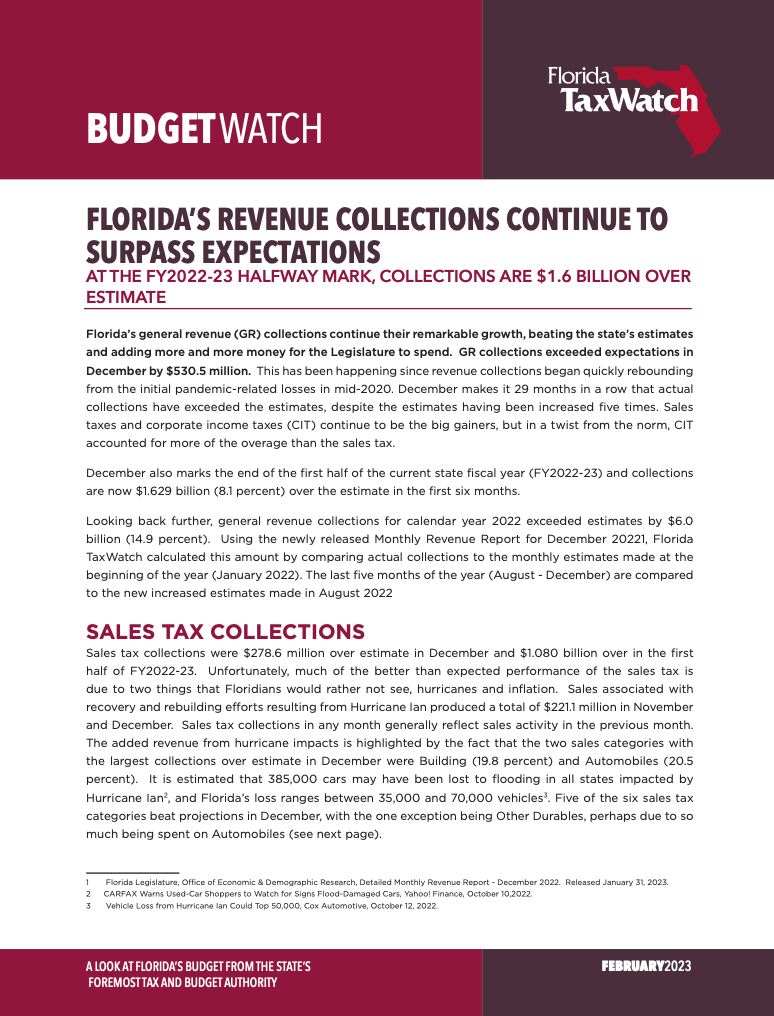Florida's Revenue Collections Continue to Surpass Expectations
 This has been happening since revenue collections began quickly rebounding from the initial pandemic-related losses in mid-2020. December makes it 29 months in a row that actual collections have exceeded the estimates, despite the estimates having been increased five times. Sales taxes and corporate income taxes (CIT) continue to be the big gainers, but in a twist from the norm, CIT accounted for more of the overage than the sales tax.
This has been happening since revenue collections began quickly rebounding from the initial pandemic-related losses in mid-2020. December makes it 29 months in a row that actual collections have exceeded the estimates, despite the estimates having been increased five times. Sales taxes and corporate income taxes (CIT) continue to be the big gainers, but in a twist from the norm, CIT accounted for more of the overage than the sales tax.
December also marks the end of the first half of the current state fiscal year (FY2022-23) and collections are now $1.629 billion (8.1 percent) over the estimate in the first six months.
Looking back further, general revenue collections for calendar year 2022 exceeded estimates by $6.0 billion (14.9 percent). Using the newly released Monthly Revenue Report for December 20221, Florida TaxWatch calculated this amount by comparing actual collections to the monthly estimates made at the beginning of the year (January 2022). The last five months of the year (August - December) are compared to the new increased estimates made in August 2022.
As Florida TaxWatch has been detailing in this Budget Watch series, federal pandemic aid and strong revenue collections have swollen the state’s General Revenue Fund, resulting in big increases in spending. Florida’s budget now stands at $110.9 billion,5 an increase of $19 billion (20.2 percent) in just two years. This does not include tens of billions in uncounted spending of federal aid.
The Florida Legislature has mostly been responsible with this windfall—making large non-recurring infrastructure investments, building state reserves, and providing limited relief for taxpayers.
The state was already expecting an estimated $12.1 billion in unobligated GR reserves and the end of this fiscal year. The better than expected revenue collections so far mean that amount will likely increase.
The state has begun the next cycle of estimating conferences, which will culminate in the General Revenue Estimating Conference in March. This will determine how much money the Legislature will have available for the FY2023-24 budget.
In light of so much uncertainty, the state’s estimators have rightly taken a conservative approach to their forecasts. The last forecast (August 2022) predicted total GR collections in FY 2022-23 would fall slightly from the prior year’s supersized collections of $44.0 billion, which was an increase of $7.8 billion (21.4 percent) over FY2020-21. It now looks like that drop in revenue may not occur.
The August GR conference, citing the existence of considerable economic risks, assumed a “downshift” would begin sometime in the current fiscal year. Halfway through, we are still waiting.